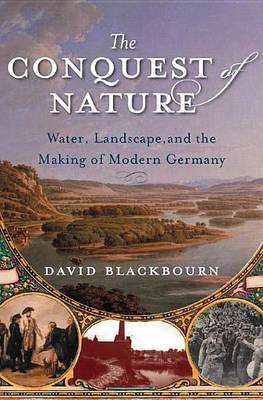This brilliant new book explores how, over the last 250 years, the German people have shaped their natural environment and how the landscapes they created took a powerful hold on the German imagination. It investigates how the most fundamental element - water - was 'conquered' by draining fens and marshes, straightening the courses of rivers, building high dams and exploiting hydro-electric power. The book begins in the 1740s with Frederick the Great of Prussia, who regarded the reclamation of marshland as 'conquests from barbarism'. We meet Johann Gottfried Tulla, 'the man who tamed the wild Rhine' in the nineteenth century. We learn about the construction of the Prussian port of Wilhelmshaven on the Jade Bay, later to become a symbol of the new Germany's naval ambitions. We witness the colonisation of the moors and the triumph of the steamship. We encounter Otto Intze, 'master dambuilder' of the years around 1900, whose modern marvels supplied drinking water to a fast-growing population and provided hydro-electrical power - 'white coal'. But the dark side of this conquest emerged under the Nazis, who set out to colonise 'living space' in the East.
Convinced of their superiority over the 'marsh-dwelling Slavs', the Nazi occupiers of Poland embarked on a programme of population transfer and racial engineering. This physical and ethnic reshaping of the east European landscape would result in the murder of millions of Jews and Poles. Race and reclamation went hand in hand. The modern idea of 'mastery'' over nature always had its critics, whether their motives were aesthetic, religious or environmentalist. Germany's defeat in 1945 brought renewed attachment to an idealised natural landscape. This persisted as a conservative reproach through the ensuing 'economic miracle', which caused major problems of pollution and environmental destruction. It was in the 1970s, however, that protecting the environment became a central part of the West German political agenda and soon began to show results. The collapse of the Wall in 1989 then revealed the catastrophic state of the environment in East Germany, a country that had been in thrall to Soviet-style industrialisation. "The Conquest of Nature" is a groundbreaking study that opens new vistas on the history of Germany.
It also shows that while mastery over nature delivers undoubted benefits, it has often come at a tremendous cost to both the natural environment and human life.
- ISBN10 1324000988
- ISBN13 9781324000983
- Publish Date 17 August 2007 (first published 19 January 2006)
- Publish Status Active
- Publish Country US
- Imprint WW Norton & Co
- Format eBook
- Language English
